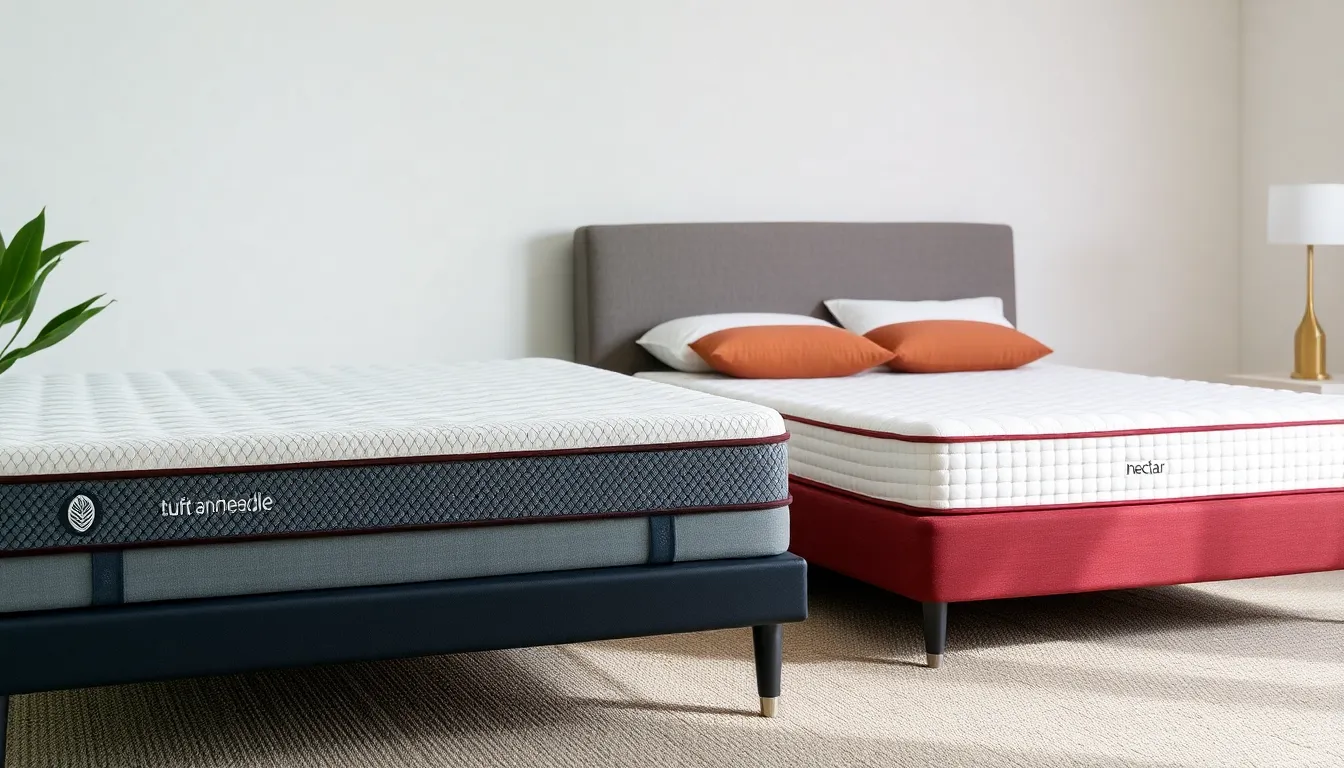Table of Contents
ToggleIn the battle of bedtime bliss, two mattress contenders stand tall: Tuft and Needle and Nectar. Each promises a dreamy escape from the daily grind, but which one really delivers the goods? Picture this: you’re sinking into a cloud of comfort or bouncing on a trampoline of support. It’s a tough choice, and the stakes are high—after all, a good night’s sleep can turn even the grumpiest morning person into a cheerful ray of sunshine.
Overview of Tuft and Needle and Nectar
Tuft and Needle, founded in 2012, emphasizes high-quality materials at an affordable price. The brand’s mattresses feature adaptive foam that provides a balance of comfort and support. Users report pressure relief and a medium-firm feel that caters to various sleeping positions.
Nectar, established in 2016, also focuses on delivering superior comfort and support but utilizes a different construction approach. Their mattresses consist of multiple layers, including memory foam designed for optimal contouring and motion isolation. Customer reviews highlight the luxurious feel and excellent support for side sleepers.
Both brands offer significant warranty periods. Tuft and Needle comes with a 10-year limited warranty, while Nectar provides a longer 365-night trial period and a forever warranty. Customers can experience both products risk-free, allowing them to identify which mattress suits their needs best.
Price points differentiate the two brands. Tuft and Needle mattresses start at around $350 for a twin size, while Nectar’s starting price is approximately $399 for a similar size. These competitive prices cater to budget-conscious consumers without sacrificing quality.
Materials used in both mattresses also vary. Tuft and Needle utilizes a proprietary foam blend that enhances breathability, while Nectar incorporates gel-infused memory foam that helps with temperature regulation. Each option addresses customer concerns regarding heat retention during sleep.
Ultimately, individual preferences will dictate the best choice between Tuft and Needle and Nectar. Each brand brings distinct characteristics that cater to different sleep styles and priorities.
Material Quality

Material quality significantly influences comfort and longevity in mattresses. Tuft and Needle and Nectar both employ unique materials to enhance sleep experiences.
Tuft and Needle Materials
Tuft and Needle utilizes a proprietary foam blend designed for breathability and support. This adaptive foam molds to body contours while maintaining a medium-firm feel, making it suitable for various sleeping positions. Its open-cell structure promotes airflow, helping to regulate temperature throughout the night. The brand focuses on durability, ensuring the foam retains its shape over time. Additional features include a minimalist design that complements contemporary aesthetics.
Nectar Materials
Nectar incorporates a multi-layer construction centered around gel-infused memory foam. This design provides excellent contouring, making it a top choice for side sleepers who require pressure relief on hips and shoulders. The gel infusion enhances temperature regulation, promoting a cooler sleep environment. High-density foam at the base offers stability and support, contributing to the mattress’s longevity. Nectar’s materials prioritize motion isolation, minimizing disturbances from partners shifting during the night.
Comfort and Support
Both Tuft and Needle and Nectar prioritize comfort and support, catering to different sleeping preferences to enhance the overall sleeping experience. Each mattress brand offers distinct features to meet various needs.
Firmness Levels
Tuft and Needle provides a medium-firm feel, ideal for a range of sleeping positions. This level of firmness caters to back, side, and stomach sleepers, ensuring adequate support across the board. Nectar, on the other hand, leans towards a softer feel, particularly beneficial for side sleepers. This softness helps cradle the body while maintaining essential support through its multi-layer design. Individual preferences dictate the ideal firmness, making it crucial to consider sleeping styles when choosing between these two options.
Pressure Relief
Optimal pressure relief sets both mattresses apart. Nectar excels in this area, employing gel-infused memory foam that conforms to the body’s contours. Such design alleviates pressure on sensitive areas like hips and shoulders, promoting better spinal alignment during sleep. Tuft and Needle also offers pressure relief with its proprietary adaptive foam, which strategically adjusts to body weight and sleeping position. This combination of support and contouring creates a balanced sleeping environment for various sleepers.
Sleeping Experience
The sleeping experience varies significantly between Tuft and Needle and Nectar mattresses. Tuft and Needle’s adaptive foam offers a medium-firm feel, providing solid support for diverse sleeping positions. Nectar excels with its gel-infused memory foam, ideal for side sleepers needing enhanced contouring and pressure relief.
Motion Isolation
Motion isolation plays a vital role in uninterrupted sleep. Nectar’s multi-layer construction allows minimal movement transfer, so partners won’t disturb each other during the night. The gel-infused memory foam absorbs motion, creating a quieter, more restful environment. Tuft and Needle provides adequate motion isolation through its adaptive foam, although it may not be as effective as Nectar for couples. Individual sensitivity to motion can influence the overall experience, making Nectar the preferred choice for those prioritizing undisturbed sleep.
Temperature Regulation
Temperature regulation significantly affects sleep quality. Tuft and Needle incorporates an open-cell foam structure, promoting airflow and reducing heat retention. This design helps maintain a comfortable sleeping temperature throughout the night. Nectar’s gel-infused memory foam also supports temperature regulation by dissipating heat and keeping the surface cooler. Both mattresses cater to sleepers who focus on staying cool, yet Tuft and Needle may suit those who prefer a firmer feel. Factors like personal preference and sleep environment contribute to the overall temperature experience with each brand.
Price Comparison
Price plays an important role in choosing between Tuft and Needle and Nectar mattresses. Tuft and Needle prices start at around $350 for the twin size, making it an affordable option. Nectar, on the other hand, begins at approximately $399 for the same size, presenting a slightly higher investment.
While both brands offer competitive pricing, the perceived value differs due to their features. Tuft and Needle provides excellent quality materials at an entry-level price, appealing to budget-conscious shoppers. Nectar, with its multi-layer construction and gel-infused memory foam, justifies its higher price tag through enhanced comfort and support.
Warranties also factor into the overall cost. Tuft and Needle backs its mattresses with a 10-year limited warranty, which is standard in the industry. Nectar stands out with a 365-night trial period and a forever warranty, allowing customers to fully evaluate their purchase and ensuring long-term satisfaction.
Sales and promotions frequently occur for both brands. Discounts may lower the initial investment, offering opportunities for consumers to secure better prices. Checking their websites or subscribing to newsletters often reveals exclusive savings.
Pricing structures may also vary based on mattress size and type. Larger sizes, such as queen and king, may increase the cost significantly. Shoppers should consider their budget when deciding which size fits best.
Overall, price comparison showcases the distinct offerings of Tuft and Needle and Nectar. Each brand presents compelling value, depending on individual preferences and requirements.
Warranty and Trial Period
Tuft and Needle offers a 10-year limited warranty, covering defects in materials and workmanship. This warranty provides customers assurance of durability and quality, allowing them to enjoy their investment with peace of mind.
Nectar surpasses this with a 365-night trial period, during which customers can return the mattress for a full refund if it doesn’t meet their needs. A forever warranty further highlights Nectar’s confidence in their product, covering defects for as long as the mattress is in use.
Both brands emphasize customer satisfaction through these generous warranty offerings. For those hesitant about their purchase, the extensive trial period from Nectar mitigates risk, ensuring sleepers can find their perfect fit.
Tuft and Needle’s shorter warranty may appeal to budget-conscious consumers, while Nectar’s trial allows for deeper exploration into personal comfort preferences. Prolonged testing provides insights into how well each mattress accommodates individual sleep styles.
Ultimately, these warranty policies play a substantial role in defining the value proposition of each brand. Differences in coverage length and trial opportunities cater to a variety of customer priorities, underscoring each brand’s commitment to enhancing the sleep experience.
Choosing between Tuft and Needle and Nectar ultimately comes down to personal sleep preferences and priorities. Tuft and Needle offers a balanced medium-firm feel that suits a variety of sleeping positions, making it a versatile option for many. Its affordability and minimalist design appeal to those seeking quality without breaking the bank.
On the other hand, Nectar shines with its plush gel-infused memory foam that provides superior contouring and pressure relief, particularly for side sleepers. The extensive trial period and forever warranty enhance its value for those who want to ensure their mattress meets their needs.
Both brands deliver quality sleep experiences, but individual comfort and sleeping style will guide the final decision. With careful consideration of features and benefits, consumers can confidently select the mattress that best aligns with their sleep goals.







